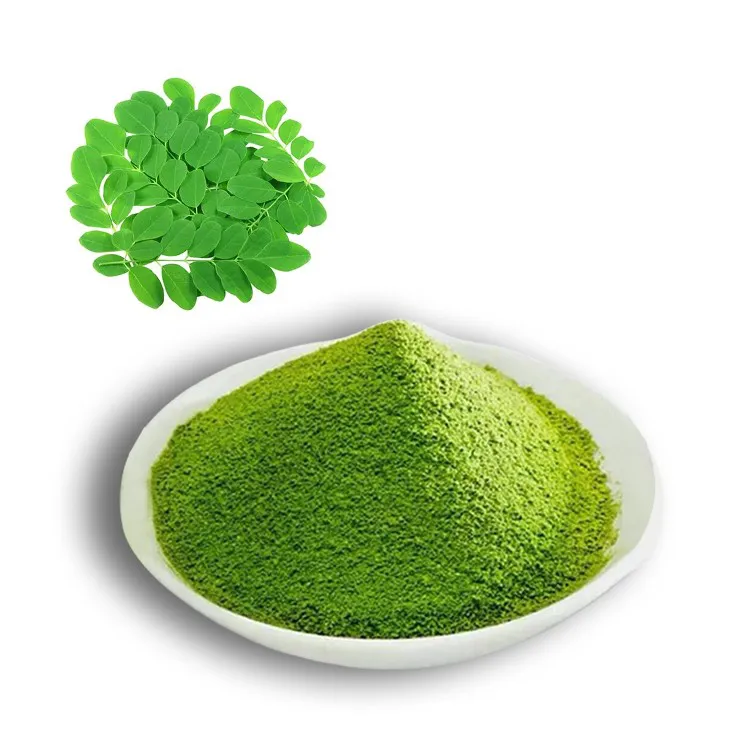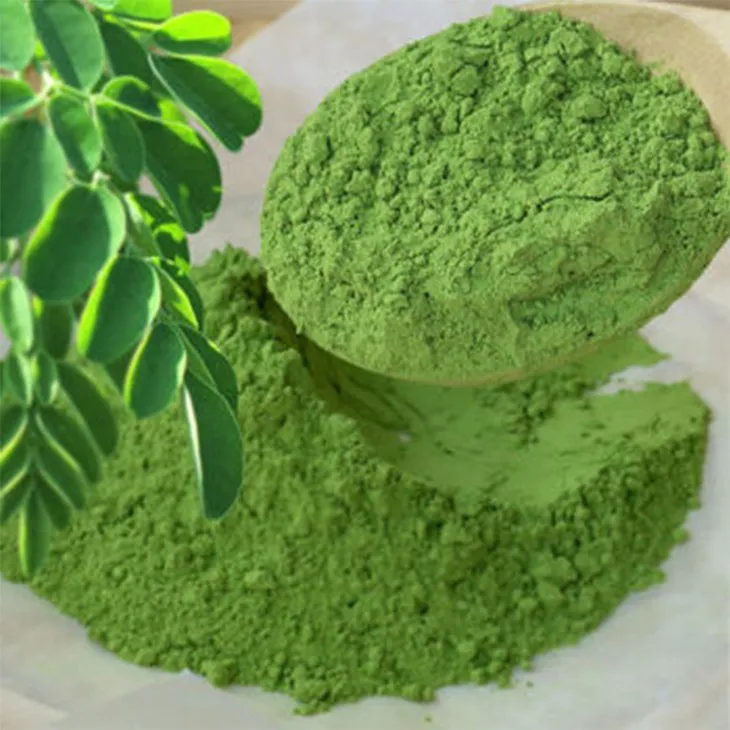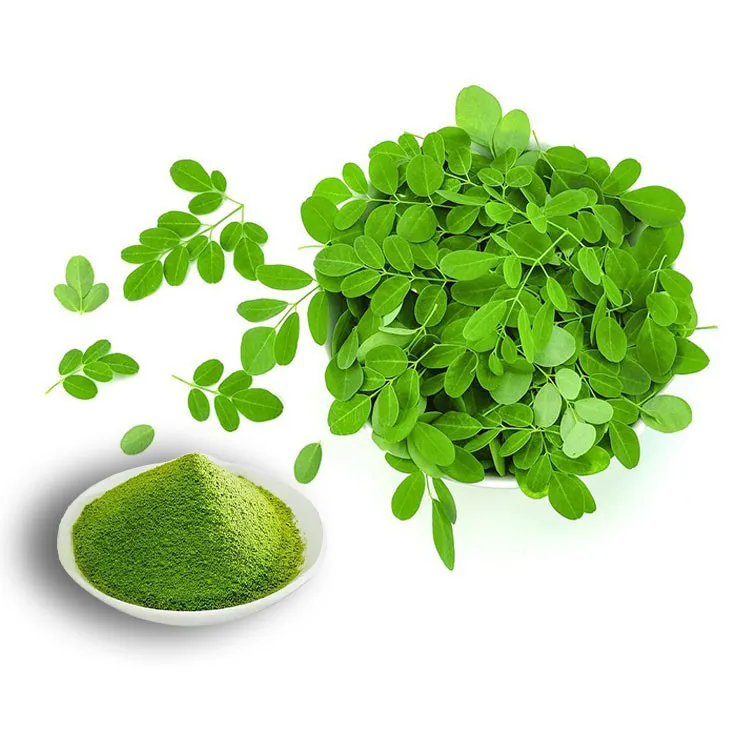- 0086-571-85302990
- sales@greenskybio.com
4 Things Consumers and Manufacturers of Moringa Powder Should Know.
2024-12-11

1. For Consumers: Understanding the Origin
Origin of Moringa powder is a crucial factor for consumers to consider. Moringa trees are native to parts of South Asia, such as India, Pakistan, and Nepal. However, they are now cultivated in many tropical and subtropical regions around the world.
When purchasing Moringa powder, it is important to know where it comes from. Moringa grown in different regions may have varying qualities. For example, moringa from its native regions might be more likely to be grown in traditional and organic ways, which could potentially affect its purity and nutrient content.
Certifications related to origin can also be a good indicator. Look for products that are labeled as being sourced from specific regions known for high - quality moringa production. Some regions may have stricter agricultural regulations, ensuring better - quality Moringa powder. Additionally, fair - trade certifications can show that the product has been sourced in an ethical manner, which benefits the local farmers and communities where the moringa is grown.

2. For Consumers: Nutritional Benefits
Moringa powder is a nutritional powerhouse. It is rich in vitamins, such as vitamin A, vitamin C, and various B - vitamins. Vitamin A is essential for good vision, healthy skin, and a strong immune system. Vitamin C is a well - known antioxidant that helps in collagen production and boosts the immune system. The B - vitamins play a crucial role in energy metabolism and maintaining a healthy nervous system.
Minerals are also abundant in moringa powder. It contains calcium, which is important for strong bones and teeth; potassium, which helps in maintaining proper heart function and fluid balance; and iron, which is necessary for the production of hemoglobin in red blood cells, preventing anemia.
In addition to vitamins and minerals, moringa powder is a good source of amino acids, the building blocks of proteins. These amino acids are essential for muscle building, tissue repair, and overall growth and development. Some of the amino acids in moringa powder are also involved in the production of neurotransmitters, which affect mood and cognitive function.
Antioxidants in moringa powder help to fight against free radicals in the body. Free radicals are unstable molecules that can cause damage to cells, leading to various diseases such as cancer, heart disease, and premature aging. The antioxidants in moringa powder, such as flavonoids and phenolic compounds, scavenge these free radicals, reducing the risk of oxidative stress - related diseases.

3. For Consumers: Potential Side - Effects
While moringa powder has numerous health benefits, it is also important for consumers to be aware of potential side - effects. In some cases, excessive consumption of moringa powder can cause digestive issues. This may include symptoms such as diarrhea, nausea, and abdominal cramps. The high fiber content in moringa powder can be a contributing factor, especially if the body is not accustomed to such a high - fiber intake.
Another potential side - effect is related to its effect on blood sugar levels. Moringa powder may lower blood sugar levels, which can be beneficial for diabetics. However, for those with normal blood sugar levels or those taking medications that also lower blood sugar, such as insulin or oral hypoglycemic agents, excessive consumption of moringa powder could potentially lead to hypoglycemia (low blood sugar). This can cause symptoms like dizziness, weakness, and confusion.
Pregnant and breastfeeding women should also be cautious when consuming moringa powder. While there is not enough conclusive evidence to suggest that it is harmful during pregnancy or breastfeeding, it is always best to consult with a healthcare provider before adding it to the diet. Some components in moringa powder may have hormonal effects, and its safety for the developing fetus or nursing infant has not been fully established.

4. For Manufacturers: Production Quality
Quality of raw materials is the foundation of high - quality moringa powder production. Manufacturers should ensure that the moringa leaves used are of the highest quality. This starts with sourcing from reliable suppliers. The leaves should be fresh, free from pesticides and other contaminants, and harvested at the appropriate time.
Processing methods play a significant role in determining the final product quality. There are different methods of processing moringa leaves into powder, such as drying and grinding. The drying process should be carefully controlled to preserve the nutrients in the leaves. Over - drying can lead to a loss of some heat - sensitive nutrients, while under - drying can cause mold growth. Grinding should be done to a consistent particle size to ensure uniform quality and easy mixing in various applications.
Quality control and testing are essential throughout the production process. Manufacturers should have in - place strict quality control measures to check for factors such as purity, nutrient content, and microbiological safety. Regular testing should be carried out at different stages of production, from raw materials to the final packaged product. This includes testing for heavy metals, which can be present in the soil where moringa is grown and can contaminate the final product if not properly monitored.
5. For Manufacturers: Regulations
Food safety regulations are of utmost importance for moringa powder manufacturers. Different countries and regions have their own regulations regarding food products, and moringa powder is no exception. Manufacturers need to be aware of and comply with these regulations to ensure that their products can be legally sold in the market.
In the United States, for example, the Food and Drug Administration (FDA) has certain standards for food additives and dietary supplements, which moringa powder may fall under depending on its intended use. In the European Union, there are also strict regulations regarding food safety, including requirements for labeling, purity, and maximum residue limits of pesticides and other contaminants.
Labeling regulations are an important aspect of compliance. The label should accurately represent the product, including information such as the ingredients, nutritional facts, origin, and any potential allergens. For moringa powder, if it contains additives or is a blend with other ingredients, this should be clearly stated on the label. In addition, any health claims made on the label should be supported by scientific evidence and comply with regulatory requirements.
6. For Manufacturers: Market Trends
Increasing consumer awareness of health and wellness has led to a growing demand for moringa powder. Consumers are becoming more interested in natural and nutrient - rich products, and moringa powder fits this trend. Manufacturers should capitalize on this by effectively marketing the health benefits of moringa powder.
Product diversification is another market trend. Instead of just offering plain moringa powder, manufacturers can develop new products such as moringa - infused beverages, moringa - based energy bars, or moringa - enhanced skincare products. This not only expands the market for moringa powder but also caters to different consumer preferences.
Online sales have become a significant part of the market for moringa powder. With the growth of e - commerce, manufacturers can reach a wider customer base through online platforms. However, this also comes with challenges such as competition from a large number of sellers and the need to ensure proper packaging and shipping to maintain product quality.
FAQ:
Q1: Why is it important for consumers to know the origin of moringa powder?
The origin of moringa powder matters because it can affect the quality and purity of the product. Different regions may have different soil conditions, farming practices, and levels of pollution. For example, if the moringa trees are grown in an area with contaminated soil, the powder may contain harmful substances. Additionally, certain regions may be known for producing high - quality moringa with better nutritional profiles. Knowing the origin helps consumers make more informed choices.
Q2: What are the key nutrients in moringa powder that consumers should be aware of?
Moringa powder is rich in various nutrients. It contains significant amounts of vitamins such as vitamin A, vitamin C, and vitamin E. These vitamins play important roles in maintaining healthy skin, eyesight, and the immune system. It also has minerals like calcium, potassium, and iron. Iron is crucial for preventing anemia, while calcium is essential for strong bones and teeth. Moreover, moringa powder is a good source of protein, which is beneficial for muscle building and repair.
Q3: What potential side - effects should consumers be cautious about when using moringa powder?
Some people may experience side - effects when consuming moringa powder. In large amounts, it can cause digestive issues such as diarrhea, nausea, and abdominal cramps. Also, moringa may interact with certain medications. For instance, it may interfere with medications for diabetes or high blood pressure. Pregnant and breastfeeding women should be especially careful, as there is not enough research on its safety during these periods.
Q4: How can manufacturers ensure the production quality of moringa powder?
Manufacturers can ensure production quality in several ways. Firstly, they should start with high - quality raw materials, which means sourcing moringa leaves from reliable farmers or suppliers. Secondly, proper processing techniques are crucial. This includes cleaning the leaves thoroughly, drying them at the appropriate temperature to preserve nutrients, and grinding them into a fine powder without contamination. Thirdly, implementing strict quality control measures, such as testing for purity, nutrient content, and the absence of harmful substances at different stages of production.
Q5: What regulations do manufacturers of moringa powder need to follow?
Manufacturers need to follow various regulations. Food safety regulations are of utmost importance. This includes adhering to standards for hygiene in the production facility, proper labeling of the product with accurate information about ingredients, nutritional values, and any potential allergens. In some regions, there may be specific regulations regarding the use of additives or preservatives in moringa powder. Additionally, if the product is being sold as a dietary supplement, there may be additional regulatory requirements related to claims made about its health benefits.
Q6: How can manufacturers stay updated on market trends related to moringa powder?
Manufacturers can stay updated on market trends in multiple ways. They can participate in industry trade shows and conferences where the latest products, consumer demands, and emerging trends are showcased. Subscribing to industry - specific magazines, newsletters, and research reports is also helpful. Additionally, conducting market research, such as surveys and interviews with consumers, can provide insights into changing preferences, new product features that are in demand, and potential areas for growth in the moringa powder market.
Related literature
- The Nutritional and Medicinal Properties of Moringa oleifera: A Review"
- "Moringa oleifera: A Multifunctional Tree for Food and Nutrition Security"
- "Quality Control and Standardization of Moringa oleifera Products"
- ▶ Hesperidin
- ▶ Citrus Bioflavonoids
- ▶ Plant Extract
- ▶ lycopene
- ▶ Diosmin
- ▶ Grape seed extract
- ▶ Sea buckthorn Juice Powder
- ▶ Fruit Juice Powder
- ▶ Hops Extract
- ▶ Artichoke Extract
- ▶ Mushroom extract
- ▶ Astaxanthin
- ▶ Green Tea Extract
- ▶ Curcumin
- ▶ Horse Chestnut Extract
- ▶ Other Product
- ▶ Boswellia Serrata Extract
- ▶ Resveratrol
- ▶ Marigold Extract
- ▶ Grape Leaf Extract
- ▶ New Product
- ▶ Aminolevulinic acid
- ▶ Cranberry Extract
- ▶ Red Yeast Rice
- ▶ Red Wine Extract
-
Chia Seed Powder
2024-12-11
-
Fenugreek Extract Powder
2024-12-11
-
Marigold Extract
2024-12-11
-
White Peony Extract
2024-12-11
-
Lavender Extract
2024-12-11
-
Lycopene
2024-12-11
-
Mango flavored powder
2024-12-11
-
Bamboo Leaf extract
2024-12-11
-
Dandelion Root Extract
2024-12-11
-
Resveratrol extract
2024-12-11





















